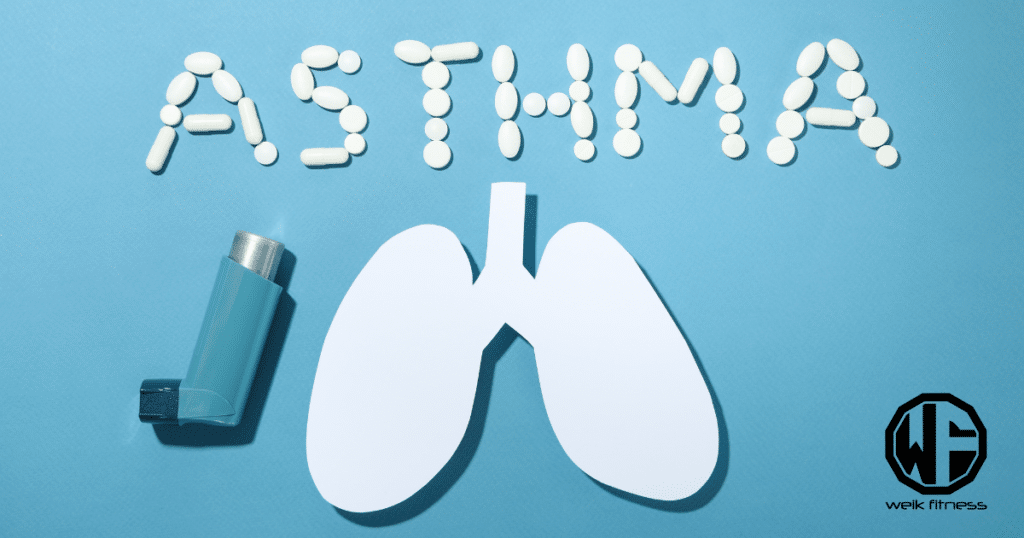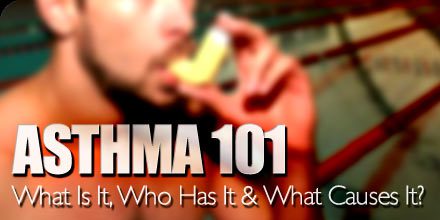Asthma 101: Everything You Need to Know
Have you ever exercised so hard that you couldn’t catch your breath? For some this is simply overexertion, for others, it comes from asthma. Either way, for many I would assume that would be a pretty scary experience. That being said, how many of you have been in your house or a friend’s house and all of a sudden you couldn’t breathe — and you weren’t even doing anything that would make you lose your breath? Now THAT is a scary thought. Asthma can happen at any moment and without warning.
Think you are suffering from asthma or know someone who suffers from it? This article will give you the ins and outs of the condition. What you read here is not meant to diagnose or treat the condition. If you believe you have asthma, please consult your doctor.
Disclaimer: This article is for informational purposes only and is not meant to treat or diagnose any condition. It is recommended that you speak with your doctor before starting any exercise program, changing your daily nutrition, or adding any supplements to your regimen.
Table of contents

What is Asthma?
Asthma is an inflammatory disorder of the airways. It is a disease where the inflammation of the airways causes the restriction of air into and out of the lungs. It is associated with shortness of breath, chest tightness, coughing, and wheezing. Unfortunately, there is no cure, although symptoms sometimes decrease over time.
How Common is Asthma?
Studies have shown that 7-10% of children and 3-5 % of adults suffer from asthma. Of the population that suffers from asthma, half of them develop the condition before the age of 10. Symptoms, especially in children, can decrease over time.
What Causes Asthma Attacks?
Asthma can be caused by inhaled allergens. These allergens can be from a number of things—pollens, molds, pet dander, and dust mites.
Related Article: What is Pycnogenol and Can It Improve Your Health?
Things such as exercise, cold air, smoke, food, drugs, pollutants, and respiratory infections can also bring on asthma.
What Happens When an Attack Occurs?

The bronchial tree muscles become tight during an asthma attack and the lining of the air passages swells. This swelling of the passages reduces airflow in and out of the lungs, which causes a wheezing sound.
Asthma attacks can happen at any time and can be triggered by a number of things. These attacks can last several minutes to a couple days. As you can imagine, due to the severity of the attack, these attacks can be very dangerous and even deadly.
Symptoms
- Wheezing
- Shortness of breath
- Breathing Which Temporarily Stops
- Cough
- Phlegm
- Nasal Flaring
- Abnormal Breathing Patterns
- Chest Pain
- Chest Tightness
Emergency Symptoms of Asthma

If any of these symptoms are experienced, seek medical help immediately:
- Sweating
- Rapid pulse
- Decreased level of consciousness
- Bluish color of the lips and/or face
- Extreme difficulty breathing
Tests
- Skin or blood tests
- Arterial blood gas
- Chest x-ray
- Eosinophil count (a type of white blood cell test)
- Lung function tests
- Peak flow measurements
Asthma Medications
There are many different types of medications out on the market. However, since this article is not meant to diagnose or treat this condition (and since I am not a doctor), I am going to refrain from putting any specific medication names in the article. It is best to talk to your doctor in order to find a medication that suits your needs.

Most initial treatments, however, are aimed specifically on avoiding the things that trigger the condition such as pet dander, dust mites, molds, pollens, and smoke. By avoiding these allergens, no medication is needed to treat the condition. If these allergens are unavoidable, that is where medication is needed.
For most people, they will need an inhaler if they are having an asthma attack — something along the lines of a symbicort inhaler.
Tips for avoiding attacks due to allergens:
- Encasing mattresses and pillows in special allergen-impermeable covers
- Remove carpeting from bedrooms
- Vacuum the house regularly
- Lower indoor humidity
- If allergic to house pets, keep them out of the individual’s bedroom
- Stay clear of smoke, pollution, dust, and fumes
There are two types of medication that are available for asthma treatment. There are long-term control medications that are used on a regular basis to help prevent attacks from happening. Long-term control medication is not meant to be used during an attack. The second type of asthma medication is quick-relief (rescue) medication, which is to be used to relieve symptoms during an actual asthma attack.


*Disclosure: This article may contain affiliate links or ads, which means we earn a small commission at no extra cost to you if you make a purchase through these links. These commissions help support the operation and maintenance of our website, allowing us to continue producing free valuable content. Your support is genuinely appreciated, whether you choose to use our links or not. Thank you for being a part of our community and enjoying our content.
PLEASE CONSIDER SHARING THIS ON YOUR SOCIAL MEDIA TO HELP OTHERS LEARN MORE ABOUT THIS TOPIC.





